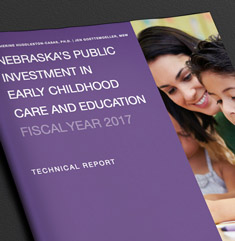
Buffet Early Childhood Institute Reports and Publications
Date of this Version
2016
Document Type
Article
Abstract
The Buffett Early Childhood Institute/Gallup Survey on Early Childhood Care and Education in Nebraska demonstrates that the vast majority of Nebraskans recognize the importance of high-quality early care and education. However, Nebraskans also report its lack of availability and affordability across the state. Most Nebraskans agree that the state should make early care and education a higher priority than it currently is today. Results from this study are based on questionnaires completed by more than 7,100 Nebraska residents. Gallup conducted the survey in English and Spanish via mail in late August through September 2015. The following represent key findings from the study:
1 Nebraskans recognize the importance of early care and education. • The vast majority (68%) of Nebraska residents say early care and education has a lot of impact on the long-term success of students in school and in life. • Only 10% of Nebraska residents strongly feel that most young children in Nebraska are prepared to be successful in school when they start Kindergarten.
2 Nebraskans do not believe high-quality early care and education is available or affordable for all families in the state. • Just 11% of Nebraska residents strongly agree that high-quality early care and education is available to every family in the state. • Only 6% of Nebraskans strongly agree that high-quality early care and education is affordable for every family in Nebraska. • Among several possible obstacles, more than a third (35%) of Nebraska residents say cost is the biggest challenge families face in obtaining high-quality care and education for their young children.
3 Nebraskans report deficiencies in early care and education in their area and in the state. • Only 15% of Nebraskans are very satisfied with the quality of early care and education programs in the city or area where they live. • Just 1% of Nebraska residents say that all children from birth to age 5 in Nebraska receive highquality early care and education.
4 Nebraskans want a greater investment in quality early care and education. • Two-thirds (67%) of Nebraskans strongly agree or agree that the state should make early care and education a higher priority than it is today. • The majority of Nebraska residents (58%) believe the state is investing too little in early care and education, while only 6% think the state is investing too much.
5 Nebraskans support early care and education for children most in need. • Only two in 10 residents (19%) strongly agree or agree that Nebraska is doing enough to help children from low-income families be ready for success in life. • Half of Nebraskans strongly agree or agree that the state should provide early care and education for all children from low-income families who choose to use it.
Included in
Child Psychology Commons, Developmental Psychology Commons, Early Childhood Education Commons, Educational Psychology Commons, Educational Sociology Commons, Education Economics Commons, Education Policy Commons, Policy History, Theory, and Methods Commons, Pre-Elementary, Early Childhood, Kindergarten Teacher Education Commons, School Psychology Commons


Comments
Copyright © 2016 Gallup, Inc.